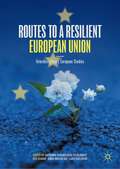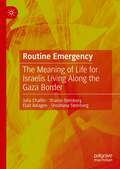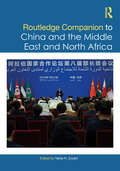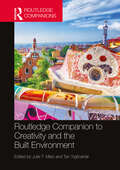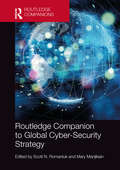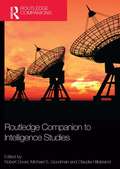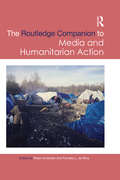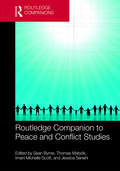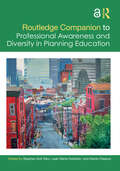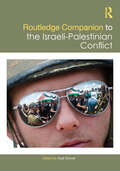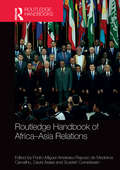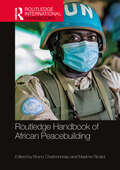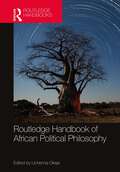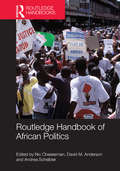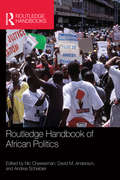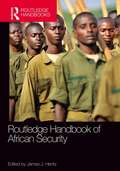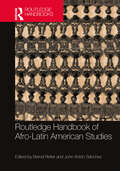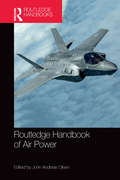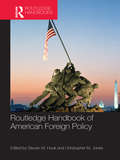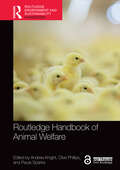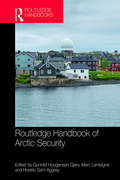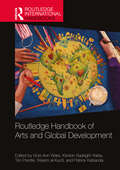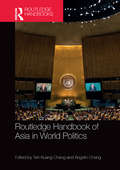- Table View
- List View
Routes to a Resilient European Union: Interdisciplinary European Studies
by Lars Oxelheim Anna Michalski Antonina Bakardjieva Engelbrekt Per EkmanThe fifth volume of the Interdisciplinary European Studies series aims to explore the EU’s pursuit of societal resilience and its role in the transition to a green economy. It brings together scholars from economics, law, and political science to provide insights related to climate change and the protection of the environment, the role of innovation in the green economy, resilience of national public health systems after the COVID-19 pandemic, regulatory resilience in the face of financial instability, and immigration. All chapters are based on up-to-date research, succinct assessment of the current state of affairs, and ongoing debates. They conclude with policy recommendations for decision-makers on European and national levels.
Routine Emergency: The Meaning of Life for Israelis Living Along the Gaza Border
by Julia Chaitin Sharon Steinberg Elad Avlagon Shoshana SteinbergThis book explores the meaning of life for Israelis from communities bordering the Gaza Strip, whose lives are bound to the intractable conflict between Israel and the Hamas regime. Based on a psychosocial qualitative study of narrative interviews, photographs, YouTube videos, and Facebook posts created by residents, the book presents the life stories of ordinary people, their perspectives of patriotism and Zionism, and their perceptions of the Gazan Palestinians. Routine Emergency captures these perspectives through analyses of residents’ interviews and photographs, the social media materials and poems fashioned from interviewees’ words. The results challenge simplistic notions of what it means to live in this warzone, offering a multi-layered analysis of life in this region, which alternates between being Heaven and Hell. Written in a reader-friendly format, Routine Emergency, offers new theoretical insights into societal beliefs connected to living in an intractable warzone on the personal, family, community and national levels.
Routledge Companion to China and the Middle East and North Africa
by Yahia H ZoubirFocusing on China’s relations with the Middle East and North Africa (MENA), this Companion provides essential analysis of a complex region which threatens to become the battleground for rival powers in the future. The Routledge Companion to China and the Middle East and North Africa brings together China scholars from around the world, including from China, the MENA region, the United States, Asia, and Europe. The contributors, experts in their respective areas––which range from politics, military and nuclear power to economics, energy, and tourism––use different methodologies to understand China’s policies in the MENA. Topics analyzed include Chinese investment in infrastructure, the COVID-19 pandemic and the Belt and Road Initiative. Divided into three Parts, the book addresses China’s multidimensional presence in the MENA and its impact on the region while also explicating the MENA’s relations with its traditional Western allies. Bilateral relations and people-to-people interactions are also explored and provide in-depth context to the areas of cooperation that are part of China’s dealings with its partners in the region. Combining contemporary analysis with accessible prose, the book will be of interest to students, scholars, and policy-makers active in international relations, security studies, and economics, as well to general audiences interested in the MENA region.
Routledge Companion to Creativity and the Built Environment (Routledge International Handbooks)
by Tan Yigitcanlar Julie T. MiaoThis book crtitically examines the reciprocal relationship between creativity and the built environment and features leading voices from across the world in a debate on originating, learning, modifying, and plagiarizing creativities within the built environment.The Companion includes contributions from architecture, design, planning, construction, real estate, economics, urban studies, geography, sociology, and public policies. Contributors review the current field and proposes new conceptual frameworks, research methodologies, and directions for research, policy, and practice. Chapters are organised into five sections, each drawing on cross-disciplinary insights and debates: Section I connects creativity, productivity, and economic growth and examines how our built environment stimulates or intimidates human imaginations. Section II addresses how hard environments are fabricated with social, cultural, and institutional meanings, and how these evolve in different times and settings. Section III discusses activities that directly and indirectly shape the material development of a built environment, its environmental sustainability, space utility, and place identity. Section IV illustrates how technologies and innovations are used in building and strengthening an intelligent, real-time, responsive urban agenda. Section V examines governance opportunities and challenges at the interface between creativity and built environment. An important resource for scholars and students in the fields of urban planning and development, urban studies, environmental sustainability, human geography, sociology, and public policy.
Routledge Companion to Global Cyber-Security Strategy
by Mary Manjikian Scott N. RomaniukThis companion provides the most comprehensive and up-to-date comparative overview of the cyber-security strategies and doctrines of the major states and actors in Europe, North America, South America, Africa, and Asia. The volume offers an introduction to each nation’s cyber-security strategy and policy, along with a list of resources in English that may be consulted for those wishing to go into greater depth. Each chapter is written by a leading academic or policy specialist, and contains the following sections: overview of national cyber-security strategy; concepts and definitions; exploration of cyber-security issues as they relate to international law and governance; critical examinations of cyber partners at home and abroad; legislative developments and processes; dimensions of cybercrime and cyberterrorism; implications of cyber-security policies and strategies. This book will be of much interest to students and practitioners in the fields of cyber-security, national security, strategic studies, foreign policy, and international relations.
Routledge Companion to Intelligence Studies
by Robert Dover Michael S. Goodman Claudia HillebrandThe Routledge Companion to Intelligence Studies provides a broad overview of the growing field of intelligence studies. The recent growth of interest in intelligence and security studies has led to an increased demand for popular depictions of intelligence and reference works to explain the architecture and underpinnings of intelligence activity. Divided into five comprehensive sections, this Companion provides a strong survey of the cutting-edge research in the field of intelligence studies: Part I: The evolution of intelligence studies; Part II: Abstract approaches to intelligence; Part III: Historical approaches to intelligence; Part IV: Systems of intelligence; Part V: Contemporary challenges. With a broad focus on the origins, practices and nature of intelligence, the book not only addresses classical issues, but also examines topics of recent interest in security studies. The overarching aim is to reveal the rich tapestry of intelligence studies in both a sophisticated and accessible way. This Companion will be essential reading for students of intelligence studies and strategic studies, and highly recommended for students of defence studies, foreign policy, Cold War studies, diplomacy and international relations in general.
Routledge Companion to Media and Humanitarian Action (Routledge Media and Cultural Studies Companions)
by Robin Andersen Purnaka L. De SilvaIn this moment of unprecedented humanitarian crises, the representations of global disasters are increasingly common media themes around the world. The Routledge Companion to Media and Humanitarian Action explores the interconnections between media, old and new, and the humanitarian challenges that have come to define the twenty-first century. Contributors, including media professionals and experts in humanitarian affairs, grapple with what kinds of media language, discourse, terms, and campaigns can offer enough context and background knowledge to nurture informed global citizens. Case studies of media practices, content analysis and evaluation of media coverage, and representations of humanitarian emergencies and affairs offer further insight into the ways in which strategic communications are designed and implemented in field of humanitarian action.
Routledge Companion to Peace and Conflict Studies
by Sean Byrne Thomas Matyók Imani Michelle Scott Jessica SenehiThis Companion examines contemporary challenges in Peace and Conflict Studies (PACS) and offers practical solutions to these problems. Bringing together chapters from new and established global scholars, the volume explores and critiques the foundations of Peace and Conflict Studies in an effort to advance the discipline in light of contemporary local and global actors. The book examines the following eight specific components of Peace and Conflict Studies: Peace and conflict studies praxis Structure–agency tension as it relates to social justice, nonviolence, and relationship building Gender, masculinity, and sexuality The role of partnerships and allies in racial, ethnic, and religious peacebuilding Culture and identity Critical and emancipatory peacebuilding International conflict transformation and peacebuilding Global responses to conflict. It argues that new critical and emancipatory peacebuilding and conflict transformation strategies are needed to address the complex cultural, economic, political, and social conflicts of the 21st century. This book will be of much interest to students of peace and conflict studies, peace studies, conflict resolution, transitional justice, reconciliation studies, social justice studies, and international relations.
Routledge Companion to Professional Awareness and Diversity in Planning Education
by Danilo Palazzo Stephen Kofi Diko Leah Marie HollsteinThe Routledge Companion to Professional Awareness and Diversity in Planning Education engenders a discourse on how urban planning as a discipline is being made attractive to children and youth as they consider their career preferences. It also provides a discourse around the diversity challenges facing the institutions for training urban planning professionals. This Companion is an impressive collection of initiatives, experiences, and lessons in helping children, youth, and the general public appreciate the importance of, and the diversity challenge confronting, the urban planning profession and education. It comprises empirical, experimental, and case study research on initiatives to address the professional awareness and diversity challenges in urban planning. It has uniquely assembled voices and experiences from countries in Africa, Asia, Europe, and North America. Contributors are educators, practitioners, and activists of urban planning as well as policymakers in their respective countries. This Companion is intended as a resource for urban planning schools and departments, foundations, non-profit organizations, private sector organizations, public institutions, teachers, and alumni, among others to learn and consciously drive efforts to increase planning education awareness among children, youth, and the general public.
Routledge Companion to Professional Awareness and Diversity in Planning Education
by Danilo Palazzo Stephen Kofi Diko Leah Marie HollsteinThe Routledge Companion to Professional Awareness and Diversity in Planning Education engenders a discourse on how urban planning as a discipline is being made attractive to children and youth as they consider their career preferences. It also provides a discourse around the diversity challenges facing the institutions for training urban planning professionals.This Companion is an impressive collection of initiatives, experiences, and lessons in helping children, youth, and the general public appreciate the importance of, and the diversity challenge confronting, the urban planning profession and education. It comprises empirical, experimental, and case study research on initiatives to address the professional awareness and diversity challenges in urban planning. It has uniquely assembled voices and experiences from countries in Africa, Asia, Europe, and North America. Contributors are educators, practitioners, and activists of urban planning as well as policymakers in their respective countries.This Companion is intended as a resource for urban planning schools and departments, foundations, non-profit organizations, private sector organizations, public institutions, teachers, and alumni, among others to learn and consciously drive efforts to increase planning education awareness among children, youth, and the general public.Chapter 6 of this book is freely available as a downloadable Open Access PDF at http://www.taylorfrancis.com under a Creative Commons Attribution-Non Commercial-No Derivatives (CC-BY-NC-ND) 4.0 license.
Routledge Companion to the Israeli-Palestinian Conflict
by Asaf SiniverThis Companion explores the Israeli-Palestinian conflict from its inception to the present day, demonstrating the depth and breadth of the many facets of the conflict, from the historical, political, and diplomatic to the social, economic, and pedagogical aspects. The contributions also engage with notions of objectivity and bias and the difficulties this causes when studying the conflict, in order to reflect the diversity of views and often contentious discussion surrounding this conflict. The volume is organized around six parts, reflecting the core aspects of the conflict: • historical and scholarly context of the competing narratives • contemporary evolution of the conflict and its key diplomatic junctures • key issues of the conflict • its local dimensions • international environment of the conflict • the "other images" of the conflict, as reflected in public opinion, popular culture, the boycott, divestment and sanctions (BDS) movement, and academia and pedagogy. Providing a comprehensive approach to the Israeli-Palestinian conflict, this companion is designed for academics, researchers, and students interested in the key issues and contemporary themes of the conflict.
Routledge Handbook of Africa-Asia Relations
by Pedro Miguel Amakasu Raposo de Medeiros Carvalho, David Arase and Scarlett CornelissenThe Routledge Handbook of Africa–Asia Relations is the first handbook aimed at studying the interactions between countries across Africa and Asia in a multi-disciplinary and comprehensive way. Providing a balanced discussion of historical and on-going processes which have both shaped and changed intercontinental relations over time, contributors take a thematic approach to examine the ways in which we can conceptualise these two very different, yet inextricably linked areas of the world. Using comparative examples throughout, the chronological sections cover: • Early colonialist contacts between Africa and Asia; • Modern Asia–Africa interactions through diplomacy, political networks and societal connections; • Africa–Asia contemporary relations, including increasing economic, security and environmental cooperation. This handbook grapples with major intellectual questions, defines current research, and projects future agendas of investigation in the field. As such, it will be of great interest to students of African and Asian Politics, as well as researchers and policymakers interested in Asian and African Studies.
Routledge Handbook of African Peacebuilding (Routledge International Handbooks)
by Bruno Charbonneau Maxime RicardAfrica lies at the centre of the international community’s peacebuilding interventions, and the continent’s rich multitude of actors, ideas, relationships, practices, experiences, locations, and contexts in turn shapes the possibilities and practices of contemporary peacebuilding. This timely new handbook surveys and analyses peacebuilding as it operates in this specifically African context. The book begins by outlining the evolution and the various ideologies, conceptualizations, institutions, and practices of African peacebuilding. It identifies critical differences in how African peacebuilders have conceptualized and operationalized peacebuilding. The book then considers how different actors sustain, construct, and use African infrastructure to identify and analyse converging, differing, or competing mandates, approaches, and interests. Finally, it analyses specific thematic issues such as gender, justice, development, democracy, and the politics of knowledge before ending with in-depth analyses of case studies drawn from across the continent. Bringing together an international line-up of expert contributors, this book will be an essential read for students and scholars of African politics, post-conflict reconstruction, security, and peace and conflict studies.
Routledge Handbook of African Political Philosophy
by Uchenna OkejaThe Routledge Handbook of African Political Philosophy showcases and develops the arguments propounded by African philosophers on political problems, bringing together experts from around the world to chart current and future research trends. Africa’s recent history has been shaped by the experiences of colonization, anti-colonial struggle, and postcolonial self-rule, so it is perhaps not surprising that political questions are also central to African philosophy. This exciting new handbook provides insights into the foundations, virtues, vices, controversies, and key topics to be found within African political philosophy, concluding by considering how it connects with other traditions of political philosophy. In doing so, this book provides important fresh perspectives that help us to gain a richer understanding of the challenges of coexistence in society and governance not just in Africa, but around the world. This book will be an important resource for researchers and students across the fields of Political Philosophy, Political Science, International Relations, and African Studies.
Routledge Handbook of African Political Philosophy
by Uchenna OkejaThe Routledge Handbook of African Political Philosophy showcases and develops the arguments propounded by African philosophers on political problems, bringing together experts from around the world to chart current and future research trends. This exciting new handbook provides insights on the foundations, virtues, vices, controversies, and key topics to be found within African political philosophy, concluding by considering how it connects with other traditions of political philosophy. The book provides important fresh perspectives which help us to a richer understanding of the challenges of co-existence in society and governance not just in Africa, but around the world.
Routledge Handbook of African Politics
by David M. Anderson Nic Cheeseman Andrea ScheiblerProviding a comprehensive and cutting edge examination of this important continent, Routledge Handbook of African Politics surveys the key debates and controversies, dealing with each of the major issues to be found in Africa’s politics today. Structured into 6 broad areas, the handbook features over 30 contributions focused around: The State Identity Conflict Democracy and Electoral Politics Political Economy & Development International Relations Each chapter deals with a specific topic, providing an overview of the main arguments and theories and explaining the empirical evidence that they are based on, drawing on high-profile cases such as the Democratic Republic of Congo, Kenya, Nigeria, Somalia, South Africa, Rwanda and Zimbabwe. The Handbook also contains new contributions on a wide range of topical issues, including terrorism, the growing influence of China, civil war, and transitional justice, making it required reading for non-specialists and experts alike. Featuring both established scholars and emerging researchers, this is a vital resource for all students of African Studies, democratization, conflict resolution and Third World politics.
Routledge Handbook of African Politics
by David M. Anderson Nic Cheeseman Andrea ScheiblerProviding a comprehensive and cutting edge examination of this important continent, Routledge Handbook of African Politics surveys the key debates and controversies, dealing with each of the major issues to be found in Africa‘s politics today. Structured into 6 broad areas, the handbook features over 30 contributions focused around:The State Identity Conflict Democracy and Electoral Politics Political Economy & Development International Relations Each chapter deals with a specific topic, providing an overview of the main arguments and theories and explaining the empirical evidence that they are based on, drawing on high-profile cases such as the Democratic Republic of Congo, Kenya, Nigeria, Somalia, South Africa, Rwanda and Zimbabwe. The Handbook also contains new contributions on a wide range of topical issues, including terrorism, the growing influence of China, civil war, and transitional justice, making it required reading for non-specialists and experts alike. Featuring both established scholars and emerging researchers, this is a vital resource for all students of African Studies, democratization, conflict resolution and Third World politics.
Routledge Handbook of African Security
by James J. HentzThis new Handbook examines the issues, challenges, and debates surrounding the problem of security in Africa. Africa is home to most of the world's current conflicts, and security is a key issue. However, African security can only be understood by employing different levels of analysis: the individual (human security), the state (national/state security), and the region (regional/international security). Each of these levels provides analytical tools for understanding what could be called the "African security predicament" and these debates are animated by the "new security" issues: immigration, small arms transfers, gangs and domestic crime, HIV/AIDS, transnational crime, poverty, and environmental degradation. African security therefore not only presents concrete challenges for international security but provides a real-world context for challenging conventional conceptions of security. Drawing together contributions from a wide range of key thinkers in the field, the Routledge Handbook of African Security engages with these debates, and is organized into four parts: Part I: The African security predicament in the twenty-first century; Part II: Understanding conflict in Africa; Part III: Regionalism and Africa; Part IV: External influences. This Handbook will be of great interest to students of African politics, human security, global security, war and conflict studies, peacebuilding, and IR in general.
Routledge Handbook of Afro-Latin American Studies
by Bernd ReiterThis Handbook provides a comprehensive roadmap to the burgeoning area of Afro-Latin American Studies. Afro-Latins as a civilization developed during the period of slavery, obtaining cultural contributions from Indigenous and European worlds, while today they are enriched by new social configurations derived from contemporary migrations from Africa. The essays collected in this volume speak to scientific production that has been promoted in the region from the humanities and social sciences with the aim of understanding the phenomenon of the African diaspora as a specific civilizing element. With contributions from world-leading figures in their fields overseen by an eminent international editorial board, this Handbook features original, authoritative articles organized in four coherent parts: • Disciplinary Studies; • Problem Focused Fields; • Regional and Country Approaches; • Pioneers of Afro-Latin American Studies. The Routledge Handbook of Afro-Latin American Studies will not only serve as the major reference text in the area of Afro-Latin American Studies but will also provide the agenda for future new research.
Routledge Handbook of Air Power
by John Andreas OlsenThe Routledge Handbook of Air Power offers a comprehensive overview of the political purposes and military importance of air power. Despite its increasing significance in international relations, statecraft and war, the phenomenon of air power remains controversial and little understood beyond its tactical and technological prominence. This volume provides a comprehensive survey designed to contribute to a deep and sophisticated understanding of air power. Containing contributions from academics and service personnel, the book comprises five sections: - Part I Foundation: the essence of air power - Part II Roles and functions: delivering air power - Part III Cross-domain integration: applying air power - Part IV Political–social–economic environment: air power in its strategic context - Part V Case studies: air power in its national context Examining a series of themes and factors that contribute to an understanding of the utility and applicability of air power, this Handbook focuses on the essence of air power, identifies its roles and functions, and places air power in its wider strategic and national contexts. The Routledge Handbook of Air Power will be of great interest to students of air power, strategic studies, defence studies, security studies and IR, as well as to military professionals and policy-makers.
Routledge Handbook of American Foreign Policy
by Steven W. Hook Christopher M. JonesNo nation has maintained such an immense stature in world politics as the United States has since the Cold War’s end. In the wake of the 9/11 attacks, prompting the global war on terrorism and the U.S. invasion of Afghanistan and Iraq, along with American economic and "soft power" primacy, there has been increased interest in and scrutiny of American foreign policy. The Routledge Handbook of American Foreign Policy brings together leading experts in the field to examine current trends in the way scholars study the history and theories of American conduct in the world, analysis of state and non-state actors and their tools in conducting policy, and the dynamics of a variety of pressing transnational challenges facing the United States. This volume provides a systematic overview of all aspects of American foreign policy and drives the agenda for further, cutting edge research. Contributors bring analytic depth and breadth to both the ways in which this subject is approached and the substance of policy formulation and process. The Handbook is an invaluable resource to students, researchers, scholars, and journalists trying to make sense of the broader debates in international relations.
Routledge Handbook of Animal Welfare (Routledge Environment and Sustainability Handbooks)
by Andrew Knight, Clive Phillips, and Paula SparksThis handbook presents a much-needed and comprehensive exploration of the rapidly growing fields of animal welfare and law. In recent years there has been increasing attention paid to our complex, multifaceted relationships with other animals, and in particular, the depth and breadth of various societal uses of animals. This has led to a reconsideration of their moral and social status, which has sometimes challenged the interests of those who use animals. In such a contested domain, sound evidence and reasoning become particularly important. Through firm commitment to such principles, this book explores the biological foundations for the moral consideration of animals and for evolving conceptualisations of animal welfare. It reviews in detail the welfare concerns associated with numerous forms of animal use. The inclusion of key recent developments such as climate change, pandemics, and antimicrobial resistance, ensures this text is among the most current in its field. The ethical implications of the various uses of animals by society are considered, and chapters provide important recommendations for reforms of practice, law, or policy. The status of animal law internationally, and in major world regions, is reviewed. Finally, the book considers human behavioural change and strategies for improving stakeholder communication and education. The handbook is essential reading for students and scholars of animal welfare, animal law and animal ethics everywhere, and for policy-makers and other professionals working in the animal welfare sector.
Routledge Handbook of Arctic Security
by Marc Lanteigne Gunhild Hoogensen Gjørv Horatio Sam-AggreyThe Routledge Handbook of Arctic Security offers a comprehensive examination of security in the region, encompassing both state-based and militarized notions of security, as well as broader security perspectives reflecting debates about changes in climate, environment, economies, and societies. Since the turn of the century, the Arctic has increasingly been in the global spotlight, resulting in the often invoked idea of “Arctic exceptionalism” being questioned. At the same time, the unconventional political power which the Arctic’s Indigenous peoples hold calls into question conventional ideas about geopolitics and security. This handbook examines security in this region, revealing contestations and complementarities between narrower, state-based and/or militarized notions of security and broader security perspectives reflecting concerns and debates about changes in climate, environment, economies, and societies. The volume is split into five thematic parts: • Theorizing Arctic Security • The Arctic Powers • Security in the Arctic through Governance • Non-Arctic States, Regional and International Organizations • People, States, and Security. This book will be of great interest to students of Arctic politics, global governance, geography, security studies, and International Relations.
Routledge Handbook of Arts and Global Development (Routledge International Handbooks)
by Tim Prentki Patrick Kabanda Kirsten Sadeghi-Yekta Vicki-Ann Ware Wasim Al KurdiThis book brings together a leading team of international experts in arts and global development to showcase effective practice and to explore how this vibrant interdisciplinary field has developed and what the latest research can teach us.Although arts play a central role in human development, and in the health and wellbeing of individuals and communities, few have attempted to comprehensively explore arts practice as global development. This Handbook first provides a theoretical framework for exploring arts and global development, before surveying a comprehensive range of art forms and development practices to explore the potential of the arts to strategically and beneficially contribute to more just and equitable conditions for communities across the globe. Stretching across the arts from theatre, dance, and music to poetry, film, and visual arts, the book covers topics as diverse as health, education, peacebuilding, livelihoods, sustainability, activism, and arts as research method in programming. The Handbook also identifies gaps in the literature, pointing towards the most pressing and promising avenues for further research over the next few years.This book will be an essential resource for any researcher, student, or practitioner wishing to understand the role of the arts in global development and in the global south more generally.
Routledge Handbook of Asia in World Politics
by Teh-Kuang Chang and Angelin ChangAsia is a complex and diverse continent, which has seen the scope and pace of transformation increase rapidly over the past 30 years. In turn, the economic growth and social change seen in the region, combined with new global security profiles and environmental challenges, have contributed to placing Asia at the forefront of international affairs. This Handbook brings together leading scholars of different disciplines, including Politics and International Relations, Security Studies and Law, to provide a comprehensive analysis of both the prospects and problems which have emerged from Asia’s rise. Examining how developments across the continent have influenced global politics and how the region has responded to the international community in the modern era, the sections cover: Major actors in Asian politics, especially China, Japan and India, International relations in Asia and intra-Asian tensions Special issues of world politics in Asia including modern conflicts in and attitudes towards the Middle East The Routledge Handbook of Asia in World Politics will be useful to students and scholars of Global Politics, International Relations and Asian Studies.
